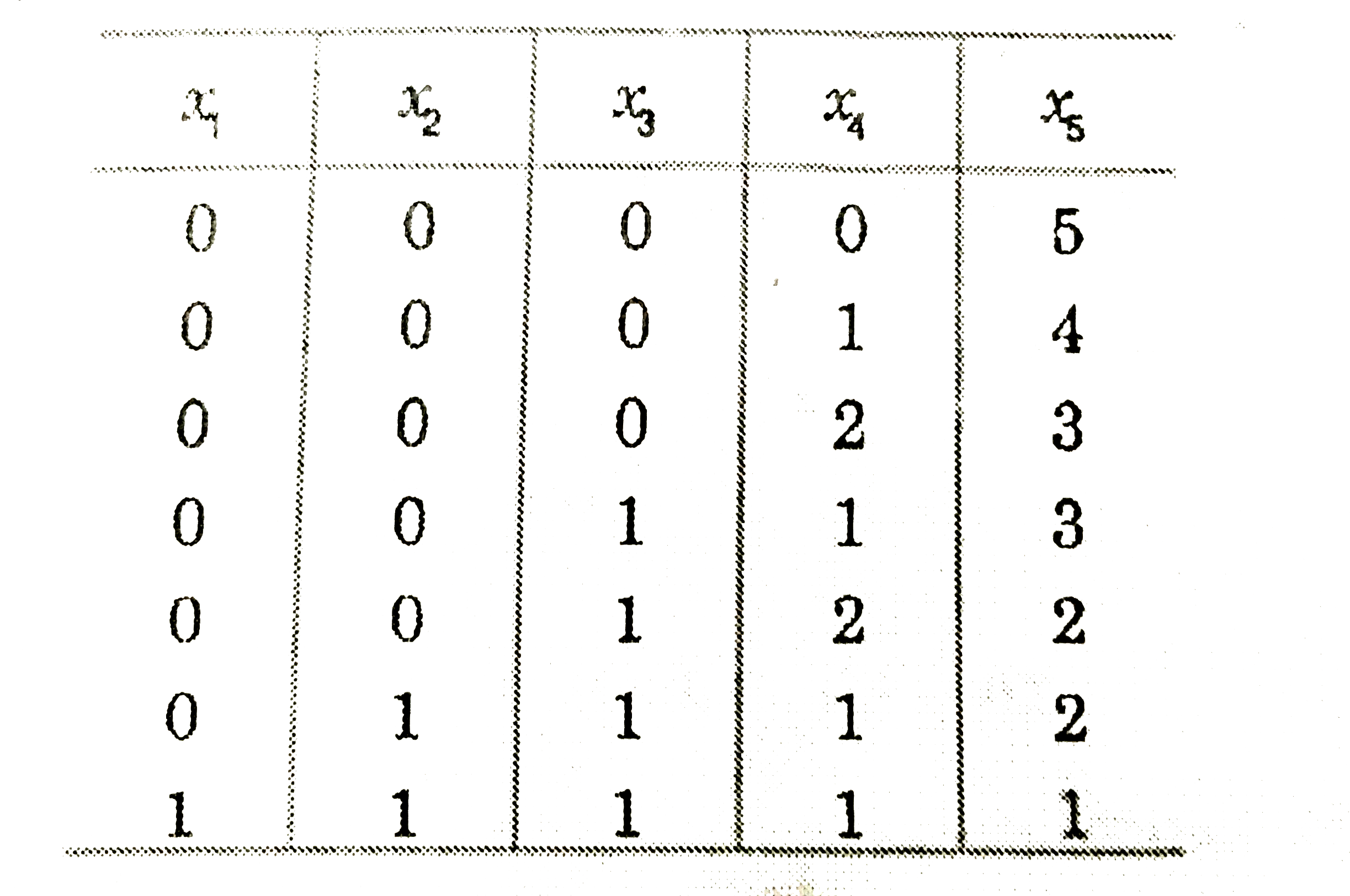Let n1<n2<n3<n4<n5 be positive integers such that n1+n2+n3+n4+n5=20. then the number of such distinct arrangements n1,n2,n3,n4,n5 is
Video Solution
Text Solution
The correct Answer is:7
PLAN Reducing the equation to a newer equation, where sum of variables is less. Thus, finding the number of arrangements becomes easier.
As n1≥1,n2≥2,n3≥3,n4≥4n5≥5
Let n1−1=x1≥0,n2−2=x2≥0,...,n5−5=x5≥0
⇒ New equation will be
x1+1+x2+2+...+x5+5=20
⇒ x1+x92)+x3+x4+x5)=20−15=5
Now, x1≤x2≤x3≤x4≤x5

So, 7 possible cases will be there.
|
Updated on:21/07/2023
Topper's Solved these Questions
- BOOK - IIT JEE PREVIOUS YEARCHAPTER - PERMUTATIONS AND COMBINATIONSEXERCISE - Multinomial, Repeated Arrangement and Selection (Fill in the Blanks )2videos
PERMUTATIONS AND COMBINATIONS
- BOOK - IIT JEE PREVIOUS YEARCHAPTER - PERMUTATIONS AND COMBINATIONSEXERCISE - Multinomial, Repeated Arrangement and Selection (Analytical & Descriptive )1videos
PERMUTATIONS AND COMBINATIONS
- BOOK - IIT JEE PREVIOUS YEARCHAPTER - PERMUTATIONS AND COMBINATIONSEXERCISE - Multinomial, Repeated Arrangement and Selection (Numerical Value )1videos
PERMUTATIONS AND COMBINATIONS
- BOOK - IIT JEE PREVIOUS YEARCHAPTER - PARABOLAEXERCISE - TOPIC 4 DIAMETER, CHORD OF CONTACT, CHORD BISECTED AND PRODUCT OF PAIR OF TANGENTS OBJECTIVES QUESTION II (ANALYTICAL & DESCRIPTIVE )5videos
PARABOLA
- BOOK - IIT JEE PREVIOUS YEARCHAPTER - PROBABILITYEXERCISE - TOPIC 5 PROBABILITY DISTRIBUTION AND BINOMIAL DISTRIBUTTION OBJECTIVE QUESTIONS ONLY ONE CORRECT OPTION (INTEGER )1videos
PROBABILITY
Similar Questions
Knowledge Check
- Question 1 - Select One
Let n≥1,n∈Z. The real number a∈0,1 that minimizes the integral ∫10|xn−an|dx is
A12B2C1D13 - Question 2 - Select One
Let an=(1+1n)n. Then for each n∈N
Aan≥2Ban<3Can<4Dan<2 - Question 3 - Select One
Let P(n):1+14+19+….+1n2<2−1n , is true
A∀nBfor n=1CFor n>I,∀n∈NDNone of these
Let a_n = ubrace(111 ... 1)_("n times"), then
View SolutionLet Sn=112+122+132 +….. + 1n2 and Tn=2−1n , then :
View SolutionLet n>1 be a positive integer, then the largest integer m such that (nm+1) divides
(1+n+n2+…+n127), isView SolutionLet n>1, be a positive integer. Then the largest integer m, such that (nm+1) divides (1+n+n2+n3+…..+n127) is:
View SolutionLet f(n)=[12+n100] where [n] denotes the integral part of n. Then the value of 100∑n=1f(n) is
View Solution

